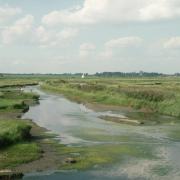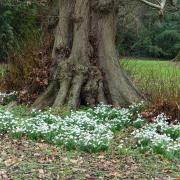Louise Denyer reviews The Poppy Factory, the contrasting tales of two women caught up in war almost a century apart, and talks to local author Liz Trenow

Out of all last year’s national events commemorating the outbreak of the First World War, the one that stands out for me is the poignant display of 888,246 ceramic poppies at the Tower of London, each one representing a British military life lost in the incomprehensible conflict.
The installation was designed to create somewhere for personal reflection for millions of visitors, as well as a spectacular display that reflected the magnitude of such an important centenary.
The blood-red poppy is a poignant symbol of remembrance across the world. Local author Liz Trenow’s third novel, The Poppy Factory, focuses on the origins of what began as an employment and fundraising initiative, and how the Poppy Appeal continues to support people who have served their country.
The book contrasts the individual experiences of war of two young women. Jess is a present day Army medic returning from her first tour of Afghanistan, while the story of housewife Rose and her veteran disabled husband Alfie is set between 1918 and 1922.

Says Liz: “It was attending Remembrance Day events in my home town of Colchester that first got me thinking about the poppy as a symbol, and how it came to be so – which is a key theme of the book.”
Liz has previously been inspired by her own ancestry in the silk weaving industry. She has published two successful novels with strong female characters, so writing this book presented an interesting opportunity to depict the various psychological effects of war from a woman’s perspective.
It’s an alternative to the numerous narratives of rat-infested trenches, and also explores the advent of gender equality, with accounts of how women began to work outside of the home for the first time, and the struggles they faced against discrimination in the workplace.
“Every author writes, to some extent, from experience. Several of my relatives served – and died – in the First World War, so I feel this quite personally.
“I was part-way through writing the character of Alfie, who has to have his leg amputated because of gas gangrene, when I realised that I was reflecting what happened to my own father.
“The reactions of Rose and Alfie are very much informed by my parents’ relationship – my father’s utter determination never to let the disability affect his life in any way, my mother learning to support him in subtle ways, without undermining his dignity.”
The novel pays close attention to detail in terms of the social history of the period and many of Rose’s diary entries are coloured with casual references to the world beyond her front door.
“When I was doing this research the Imperial War Museum was closed for refurbishment in readiness for the first year of commemorative events, but the British Library has many resources – such as newspapers from the time – that I was able to tap into.
“The internet is brilliant – you can find out what was happening on a single day, both in the locality, in the country and in the world, and even what the weather was like at specific times of the day.
“Pathé News clips on YouTube were also invaluable for giving a real sense of events as they were experienced at the time.”
Liz’s first visit to the real-life Poppy Factory provided a useful insight into its employability service, which helps to get disabled veterans back into work in their own communities, using the skills they have gained during armed service.
“That changed my thinking about the novel completely. At that point I realised I would need a contemporary storyline about a returning Afghanistan veteran, so that I could reflect the up-to-date work of the Poppy Factory as well as their original intention to employ veterans in making poppies.”
The characterisation of Jess is quite rare for this type of fiction. The trauma of war and the loss of close friends and loved ones affect her severely. She becomes an alcoholic with anger management issues, a storyline which sympathetically illustrates how post traumatic stress disorder (PTSD) can have a significant impact when someone is struggling to come to terms with what they have witnessed.
During her research, Liz was particularly moved by meeting a shy 19-year-old medic who had witnessed extraordinary and horrific events in Afghanistan.
“She showed enormous courage and saved many lives, and, on her return, was awarded the Queen’s Commendation for bravery,” says Liz.



























